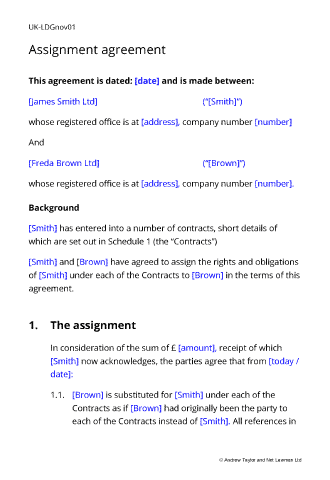Assignment agreement

Document overview

 England & Wales
England & Wales Scotland
Scotland

- Length:4 pages (1020 words)
- Available in:
 Microsoft Word DOCX
Microsoft Word DOCX Apple Pages
Apple Pages RTF
RTF

If the document isn’t right for your circumstances for any reason, just tell us and we’ll refund you in full immediately.

We avoid legal terminology unless necessary. Plain English makes our documents easy to understand, easy to edit and more likely to be accepted.

You don’t need legal knowledge to use our documents. We explain what to edit and how in the guidance notes included at the end of the document.

Email us with questions about editing your document. Use our Lawyer Assist service if you’d like our legal team to check your document will do as you intend.

Our documents comply with the latest relevant law. Our lawyers regularly review how new law affects each document in our library.
About this assignment agreement
In legal terminology, assigning means transferring contractual rights and obligations to a someone not a party to the original agreement, without the consent of the other original party.
Contracts are assigned when the agreement of one of the parties to the original contract cannot easily be obtained, or where the original agreement allows transfer without the consent.
Assignment is most commonly used when a large number of contracts are transferred from one business to another, for example when a telephone service provider sells its UK contracts or a white goods retailer sells its maintenance contracts.
When to use this agreement
The basic law is that A cannot transfer to C the obligations he has under a contract with B, without B agreeing. So what happens is that all three enter into another type of agreement - one of “novation” whereby the proposed transfer is made with B’s permission.
Most businesses that need to set up multiple contracts make sure the terms of the contract allow them to assign the contract without permission of B. In those cases, an agreement like this one can be used.
If your multiple agreements do not include this provision, you may still wish to use this agreement and take the small risk that some subscribers or users may walk away. If they do not, but instead carry on as before and make their next payment to the new owner, they are, in law, affirming the contract with the new owner, and all is well.
So a novation should be used where practicable and assignment is the fallback where there is a large number of contracts or where novation is unnecessary because all the contracts permit assignment anyway.
Whether or not the customers stay or go after the assignment is very important. The exact tone to use in a letter or message is important. So we include with this agreement a letter template to send to customers informing them of the change.
You should novate rather than assign if all three parties are available and agree. Use this agreement to novate a service contract.
You may like to read more about the difference between the two types of agreement.
Agreement features and contents
- Suitable when either party is resident outside the UK
- Comprehensive provisions provide ideas for you to mould
- Letter to customers included so that you can ensure a successful future relationship with your new clients
The document contains the following sections:
- Details of the parties
- Warranties
- The assignment
- Existing claims: sets out how outstanding claims will be dealt with
- Other usual legal provisions in plain English

Recent reviews
Choose the level of support you need
Document Only
This document
Detailed guidance notes explaining how to edit each paragraph
Lawyer Assist
This document
Detailed guidance notes explaining how to edit each paragraph
Unlimited email support - ask our legal team any question related to completing the document
- Review of your edited document by our legal team including:
- reporting on whether your changes comply with the law
- answering your questions about how to word a new clause or achieve an outcome
- checking that your use of defined terms is correct and consistent
- correcting spelling mistakes
- reformatting the document ready to sign
Bespoke
A document drawn just for you to your exact requirements
Personalised service provided by an experienced solicitor
Free discussion before we provide an estimate, for you to ask questions and for us to understand your requirements
Transparent fees - a fixed fee for the basic work, a fixed hourly rate for new or changed instructions, and no charge for office overheads or third party disbursements
Careful and thorough consideration of your circumstances and your consequent likely practical and legal requirements
Provision of options that you may not have considered with availability for discussion
Help and advice woven into the fabric of our service so that you can make the best decisions
All rights reserved
